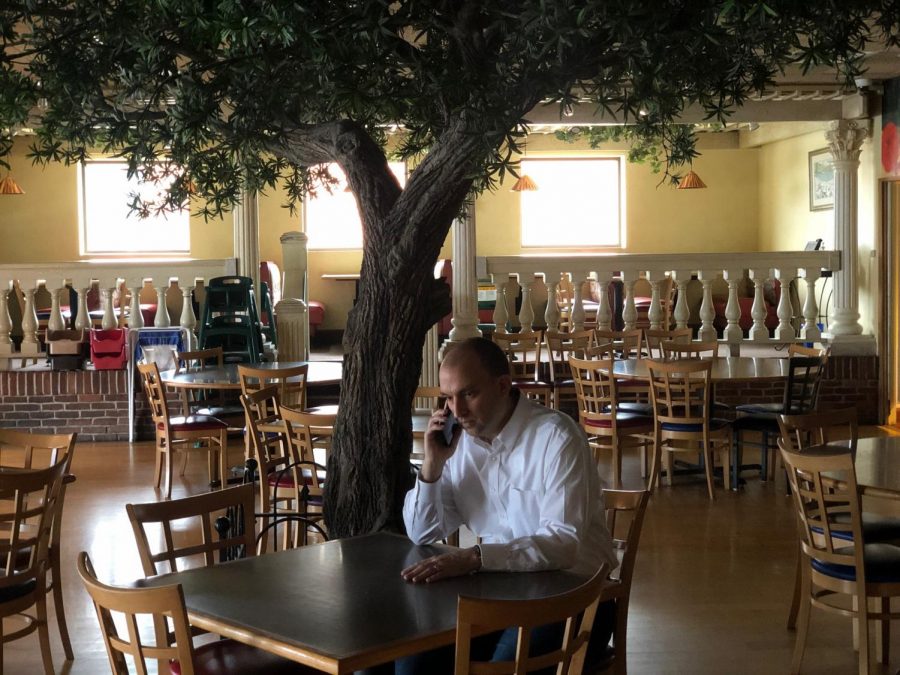Adornetto thanks locals for keeping local restaurants in business during shutdown
June 5, 2020
A local restaurant owner, who also serves on the board of the Ohio Restaurant Association, played a pivotal role in helping guide and draft the policy to allow bars and restaurants to reopen throughout the state.
Adrian Adornetto, who owns Adornetto’s, Giacomo’s and The Old Market House Inn, all three locations in Zanesville, was able to provide a unique insight into the industry due to his assortment of restaurants.
“Probably one of the reasons I was appointed on the board was that I’ve got a unique situation. It might sound kind of different to say because Zanesville is used to it this way, but a lot of restaurants have one location or they have three of the same style,” said Adornetto. “I’ve got three different parts of the industry. I’ve got fine dining with The Old Market House Inn, I’ve got Adornetto’s Pizzeria, and I have Giacomo’s, which offers sandwiches and deli selections.”
Like many business owners, Adornetto was affected when Governor Mike DeWine announced the closure of bars and restaurants to dine-in service at the end of business on March 15.
While Adornetto was able to pivot some of his locations to carry out or drive-through service with heightened safety and sanitation standards, The Old Market House Inn remained closed for nearly 11 weeks, opening up Tuesday, June 2 to patrons.
“We have been 100 percent cashless,” said Adornetto when discussing policies his businesses implemented beginning March 16. “My team was trying to think of every single thing that we could do that when the customer came to us so that nothing would leave the car or the customer that we would take inside our building.”
Customers were asked to provide their information over the phone when placing an order to ensure cards would not have to be touched by employees.
Adornetto also implemented temperature checks and a logbook of employees early on to prevent an outbreak at his locations, ideas he brought with him to DeWine’s restaurant task force.
“Our customers have been so gracious in working with us on that and understanding the different things in our procedures, but we thought it was one of many strong steps we took to keep our employees and frankly our customers safe,” said Adornetto.
As a local business owner, Adornetto was faced with a tough dilemma — he cares about his employees, but he also has to run a business, which meant he was forced to lay off employees. Nearly half of his staff was laid off during the shutdown, with staff at The Old Market House Inn particularly hard hit.
DeWine’s actions also had unexpected consequences on businesses throughout Ohio. Restaurants, including those Adornetto runs, daycares and schools were closed, leaving many parents with no one to watch their small children or help with school lessons during the day.
“They might have someone at their house to take care of that’s elderly and with school out that’s a big issue, they need to be at home working with their kids. I even had some employees I continue to employ that had to come to me saying, ‘this is going to sound crazy and I hope you’re not mad, but I need to get my hours reduced. Schools are out and I have kids who need to get these packets done and I have no baby sitter.’ You work with them,” Adornetto said.
“You got people who are still scared,” Adornetto said with a heavy breath. “Everyone is nervous about what’s going on, will I be able to reopen my business, will my employees be able to pay rent.”
While the political debate continues about the additional $600 per week those on unemployment receive, Adornetto, who many times discussed his concern for the wellbeing of his staff, said the payments make sure his employees are taken care of due to no fault of his or their own.
For Adornetto, DeWine’s actions were bittersweet. He applauds the governor for creating an advisory panel of restaurant owners to help make recommendations for reopenings, unlike other governors who set their own policies and regulations without outside advice.
However, DeWine’s actions also mean that some businesses, many local and family-owned, might never return, leaving communities and families in a state of despair, while large corporate businesses are able to survive.
Adornetto, who found out on a Friday morning he was appointed to the advisory panel, highlighted the uniqueness of the situation by explaining they had their first meeting that night.
“If it wasn’t what we’re going through right now, you wouldn’t have got all these restaurant people on the phone at 5 o’clock on a Friday night,” Adornetto explained.
The members of the task force worked hours each day, tirelessly, to come up with solutions and best practices as quickly as possible.
“Every day counts for someone in our industry, whether we know them or not,” said Adornetto. “Many of them are getting ready to go out of business – they are on the verge of bankruptcy.”
Eventually, the team submitted their proposal to the Governor, who had lots of questions, according to Adornetto, but he did not override their recommendations.
Unlike other states, the panel chose not to select an occupancy rate, which is often set by the local fire or building department but to limit by distancing customers.
“Nobody knows how many I sit in my restaurant,” Adornetto said while he explained that many establishments have open floor spaces that can be reconfigured to adhere to the guidelines, while also giving the businesses the opportunity to be innovative.
Adornetto said he understands that both businesses and customers may be upset with the regulations, but everyone is trying to do the best that they can.
“These restaurants and employees want to welcome people back safely, and they want to be employed. They want to take care of people, they want to make sure people feel safe, but it is going to be different,” said Adornetto. “It’s for everybody’s safety, and the employees in those establishments are doing the best that they can with everything we have to do to adjust for regulations because they want to keep on having a job.”
“It will take a lot of planning,” Adornetto said as he discussed the amount of training and new procedures that must be learned. “It’s too much information for an employee to learn in one hour in one day.”
As businesses struggle to stay afloat, especially locally owned ones, Adornetto said he is proud of the support customers have given their local restaurants, which helps keep people employed.
“If I had the chance to say one statement to the community, I would say, quite frankly, thank you. Thank you so much for supporting any restaurant in our industry,” Adornetto said with hope as he, as well as others, look to reopen their business in the community.
















